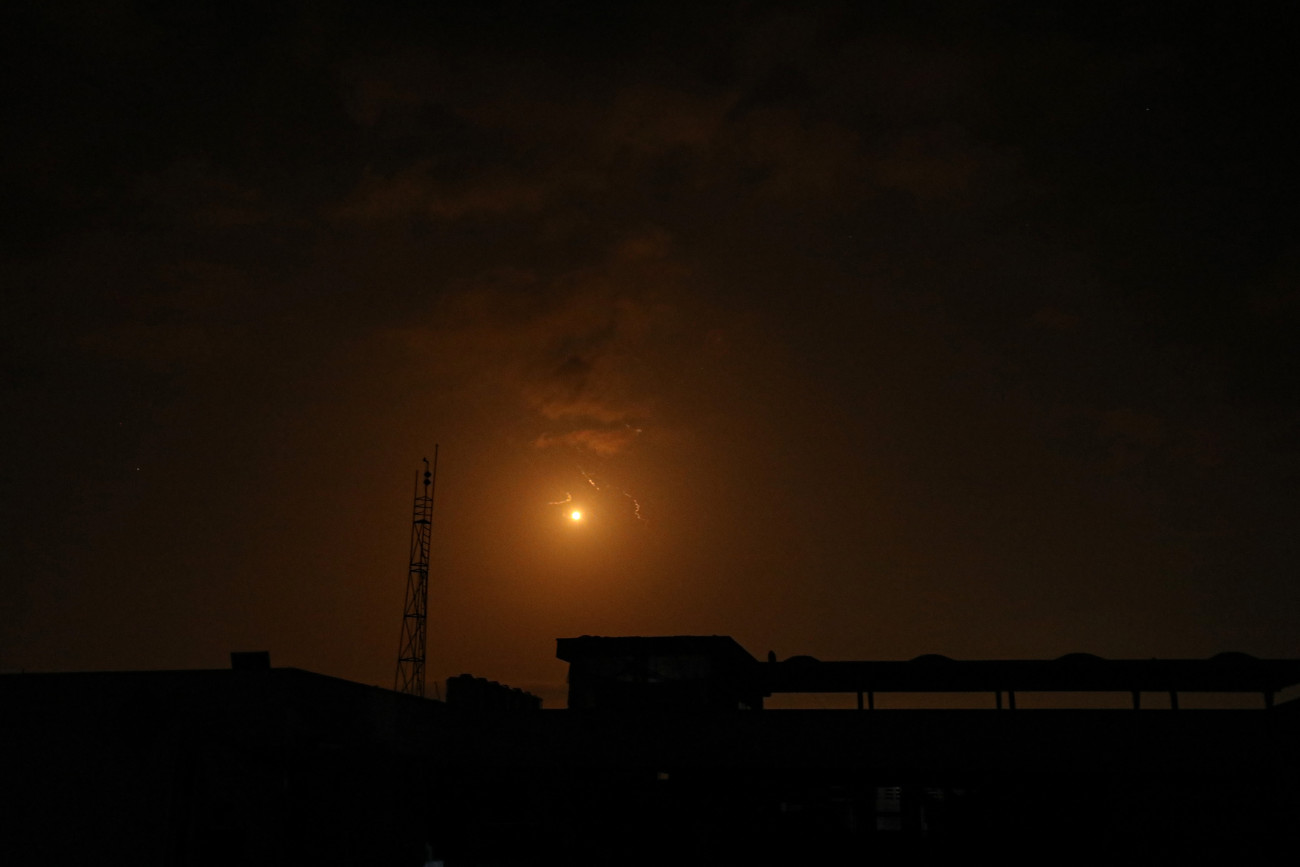

Introduction
After promising to retaliate against an Israeli airstrike on an Iranian consular facility in Damascus, Iran carried out its first ever direct attack on Israel. Late on April 13, it launched hundreds of missiles and drones toward Israeli targets, though hours later, most were downed by the air-defense forces of Israel and its allies and partners.
In the latest installment of the Defense Rapid Reaction series, experts from MEI’s Defense & Security Program provide their views on the regional implications of Iran’s unprecedented attack, how the United States could or should respond, as well as what the incident suggests about the ability to deter Tehran in the future.
Photo by Dawoud Abo Alkas/Anadolu via Getty Images
Reactions
-
Michael K. Nagata
Michael K. Nagata

A sharp escalation, but the strategic reality remains largely unchanged
Iran’s airstrikes on Israel this weekend add another layer of strategic uncertainty to the turmoil gripping the Middle East. However, this attack probably changes very little strategically for the United States, or for Israel.
Although Iran reportedly unleashed hundreds of missiles and drones, which it justified as retaliation for Israel’s April 1 strike on Iranian personnel in Syria, the vast majority were shot down either along the way or by Israeli air defenses themselves. Tehran has already announced that, “The matter can be deemed concluded.” Whether the Israelis will deem it so remains to be seen, but popular sentiment in Israel urging reciprocal retaliation will likely be high, at least for now.
Global reactions so far have been predictable, with the US and Western countries generally condemning Iran’s actions, while warning against escalation. Within the region, local governments have generally been cautious and non-accusatory, a good example being Egypt’s public statement calling on “all concerned parties to try to contain the situation and to stop the escalation.” It will take time to know what so-called “Arab street” sentiment will be, but it is likely to be strongly anti-Israeli and anti-US. Ironically, the absence of significant Israeli casualties from this strike will probably only fuel that public rancor.
Accordingly, one can probably draw at least three preliminary strategic conclusions from Tehran’s efforts to directly strike Israel.
First, Iran felt compelled to act in the wake of Israel’s deadly strike on an Iranian consulate in Damascus. This was likely a mix of genuine revenge-seeking and a perceived need to show resolve to its own people as well as other Middle Eastern populations. Yet Tehran’s very quick public statement calling the matter “concluded” indicates a wish to avoid further escalation.
Second, this attempt to attack Israel changes nothing about the latter’s ongoing war with Hamas, militarily or politically. It might, at least temporarily, bolster Israeli domestic support for Prime Minister Benjamin Netanyahu’s persistent call for invading Rafah, the perceived “final stronghold” for Hamas.
Third, this attack will likely entangle the United States even more strongly into a region it had once sought to significantly withdraw from. And it will only further complicate US efforts to “pivot” to other global challenges such as Russia or China.
Lt. Gen. (ret.) Michael K. Nagata is a Distinguished Senior Fellow on National Security at MEI. He retired from the US Army in 2019, after 38 years of active duty, with 34 years in US Special Operations. His final position was director of strategy for the National Counterterrorism Center from 2016 to 2019.
-
Kevin Donegan
Kevin Donegan

US forces rally to help thwart Iranian attack — but are we closer to a regional war?
On Saturday, hundreds of Iranian ballistic missiles, cruise missiles, and drones were launched over 1,100 miles directly at Israel. Most were intercepted, but this time there was ample warning to enhance readiness and for the United States to preposition missile defense forces at sea and in the air, including moving a carrier strike group to the Eastern Mediterranean and adding additional F-15 fighters to the already deployed squadrons of F-16s and A-10s. These US forces, along with forces from the United Kingdom, Jordan, and others, knocked down a good number of the Iranian weapons before they reached the robust Israeli air-defense network.
Iran has declared the matter "concluded," clearly signaling its intent for the attack not to spark a regional conflict. Yet what remains is much more daunting: First, Iran has demonstrated the will and means to directly attack Israel. Second, Hezbollah, an Iranian proxy, remains situated on the northern border of Israel, where it wields a lethal arsenal of 100,000 to 200,000 missiles and rockets. And third, to the southeast, the Iranian-backed Yemeni Houthis are demonstrating their own growing capability to launch missiles and drones against Israel and Western commercial and national interests. Added to this list is the lack of any significant international impediment for Iran to marry its developing nuclear capability to its ballistic missiles. Taken together, it is clear why the region looks as close to all-out war as it has ever been.
At a time when the US administration wanted to greatly reduce its force commitment in the Middle East in order to focus on China, US forces will now be committed to the region for the foreseeable future. For the near term, a US Navy carrier strike group and ballistic missile defense (BMD) ships will likely be stationed close to Israel.
At the same time, the Tehran-backed Houthis, a designated terrorist organization, retain the capability to hold hostage the free flow of commerce through the Red Sea. This will necessitate the US to lead a coalition to eliminate this threat and stop the flow of arms and training to Yemen from Iran.
Lastly, and most importantly, although direct attacks on US forces in Iraq and Syria have been halted for now, the United States will need to ensure adequate missile and drone protection for its forces in the Middle East deployed there to continue counter-terrorist operations.
The sheer volume and complexity of Saturday’s attack by Iran should serve as a needed wake-up call for Arab nations to double down on efforts to develop, with US support, a regional Integrated Missile Defense capability. This should fully leverage the Abraham Accords and include Israel so that these countries can present a unified front to this common threat from Iran.
Vice Admiral Kevin “Kid” Donegan (ret.) is the former commander of US Fifth Fleet, Naval Forces Central Command, director of operations at US Central Command, and commander of our forward deployed Carrier Strike Group based in Japan. He is currently a Distinguished Senior Fellow at MEI.
-
Mick Mulroy
Mick Mulroy

Crossing the Rubicon
Iran’s missile and drone attack against Israel on Saturday is a very significant event, even though it didn’t have much of an actual impact on Israeli civilian or commercial infrastructure. Thanks to the air-defense capabilities of Israel itself — with the help of the United States, United Kingdom, France, Jordan, and others — the vast majority of the incoming Iranian missiles and drones were shot out of the sky.
Iran’s direct attack on Israel was a first. Until now, few considered such a strike likely since Iran has mostly used proxy forces to conduct its attacks against Israel and the US in an attempt to avoid direct consequences to itself.
That paradigm needed to change, and it has. The incident that started the latest confrontation was a suspected Israeli attack earlier this month on a covert facility (Iran claims it was its consulate) in Damascus, which hosted Islamic Revolutionary Guard Corps (IRGC) Quds Force senior commanders and Hezbollah leaders. The IRGC is precisely the entity that supports Iran’s proxy and allied forces like Hezbollah, Hamas, and the Houthis; while Hezbollah, the most significant of these regional proxy groups, attacks Israel and US military forces nearly continuously.
The hundreds of Iranian drones and cruise missiles launched against Israel on Saturday (violating several countries’ airspaces) likely synced up with separate attacks from Tehran-backed militias in Iraq and Syria, Hezbollah in Lebanon, and the Houthis in Yemen. Even with all that, Iran proved to have limited ability to cause damage against its target — not for lack of trying but because of the superior air- and missile-defense capabilities of Israel and its partners. That said, this several-hours-long defense was estimated to cost over $1 billion.
If Iran had been successful as intended, its strikes could have killed many civilians and severely damaged much of Israeli civilian and commercial infrastructure.
Because Iran was ultimately unsuccessful, Israel has options. The Israeli government will likely chose to respond directly against Iran. However, the US will try to dissuade such action in order to contain and prevent the current cycle from expanding.
If Israel does respond, its actions could be as significant as striking Iran’s suspected nuclear weapons facilities or going directly after the country’s defense-industrial base. If Israel carries out either or both successfully, Iran will have found it made a strategic mistake in mounting Saturday’s attack.
How should US policy adjust to Iran’s unprecedented attempted strikes?
The first move should be passage by Congress of the supplemental aid to support Israel — this week and without delay. If it wasn’t for US security assistance, including air-defense capabilities, we could now be facing a major regional war. That supplement, as well as the ones for Ukraine and Taiwan, are in the United States’ own national security interest. It’s not charity; it contributes to US national defense.
Second, the Stop Harboring Iranian Petroleum (SHIP) Act, passed with bipartisan support in the House of Representatives, now needs to be taken up in the Senate. This legislation would help prevent Iran from funding its malign actions through the sale of oil, 80% of which is purchased by China.
And lastly, the US needs to understand and plan for what it is willing to do to stop Iran from becoming a nuclear-armed country. If nothing is done to stop Tehran, it will happen soon. And the Iranian regime has emphatically proven it cannot be allowed to wield the nuclear bomb.
Mick Mulroy is a former Deputy Secretary of Defense for the Middle East, a retired CIA officer, a retired US Marine, a Middle East Institute Senior Fellow, and an ABC News national security and defense analyst.
-
Jeff Jager
Jeff Jager

Iran, undeterred
The inevitability of Iran’s strike against Israel on the night of April 13-14 — carried out in retaliation for Israel’s April 1 strike on an Iranian consular compound in Damascus — does little to lessen the significant escalation it represents. Tehran’s response was unprecedented as the first direct attack by Iran on Israeli territory in the 45-year history of the Islamic Republican regime. Iran crossing this threshold responds directly to the unprecedented nature of Israel’s April 1 strike on inviolable Iranian diplomatic facilities. Iran justified yesterday’s barrage in the language of legitimate defense. Supreme Leader Ayatollah Ali Khamenei, on April 10, stated that, Israel’s April 1 assault “was like they attacked our territory,” and the Iranian Permanent Mission to the United Nations tweeted that yesterday’s Iranian strike was “conducted on the strength of Article 51 of the UN Charter pertaining to legitimate defense.”
Iran launched about 170 drones, 120 ballistic missiles, and 30 cruise missiles from four locations (Iran, Lebanon, Iraq, and Yemen). While the exact mix of drones and missiles are not yet confirmed, Iran has a vast arsenal with as at least nine types of missiles (including, prominently, the Sejil, Haj Qasem, and Shahab-3) and at least seven types of drones (including the Kaman-22, Kian-2, Mohajer-10, Shahed-129, Shahed-136, and Shahed-149 Gaza) capable of reaching Israel from Iranian territory. Initial indications suggest Iran employed the Shahed series of drones in yesterday’s attacks. Targets comprised of sites across Israel, including the Nevatim Airbase, home to Israel’s F-35 fleet.
The Iranian regime is not suicidal. Iran likely expected — perhaps even hoped — that Israel would shoot down a vast majority of the incoming drones and missiles. Israel, with its partners, claims to have downed more than 99% of them. Iranian drones, in particular, fly slowly and thus make easier targets for air-defense systems. And while Iran may be disappointed with the tactical effectiveness of yesterday’s attack (reports suggest only infrastructure damage at Nevatim Airbase and one wounded civilian), the regime is likely pleased that Prime Minister Benjamin Netanyahu has initially characterized it as an Israeli win, with nothing of “value” damaged. Iran has apparently achieved its objective: a substantive response calibrated to match the unprecedented nature of Israel’s April 1 attack, which, while shattering Iran’s long history of plausible deniability, caused little real damage, thereby mitigating the risk of a massive and proportional (or disproportional) response by Israel. As Iran’s Mission to the UN tweeted, for Iran, “the matter can be deemed concluded.”
Iran also is likely to be pleased with the capabilities it demonstrated, including to coordinate a mass missile and drone swarm attack from a widely dispersed area, perhaps based on lessons learned from the war in Ukraine. Moreover, it has showcased a successful use of precision-guided targeting capabilities, with at least several of its missiles hitting their designated targets, and the capability to overwhelm (just) Israel’s air defense. Israeli air defenses are not impenetrable.
Israel intended its April 1 attack to “reestablish deterrence” against Iran. This phrase will feature prominently in commentary and responses to yesterday’s attack. But that represents a fundamental misunderstanding of deterrence, as it assumes a prior condition of deterrence that has not existed for some time. Despite President Joe Biden’s stringent warning (“Don’t!”) on Oct. 7, 2023, for Iran not to escalate hostilities against Israel, and despite his use of the same warning earlier this week, Iran remains undeterred.
Jeff Jager is a Non-Resident Senior Fellow with MEI’s Defense & Security Program.










